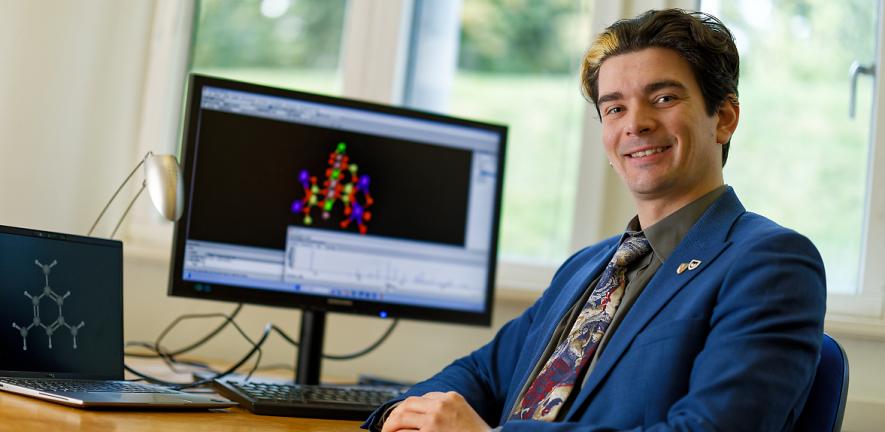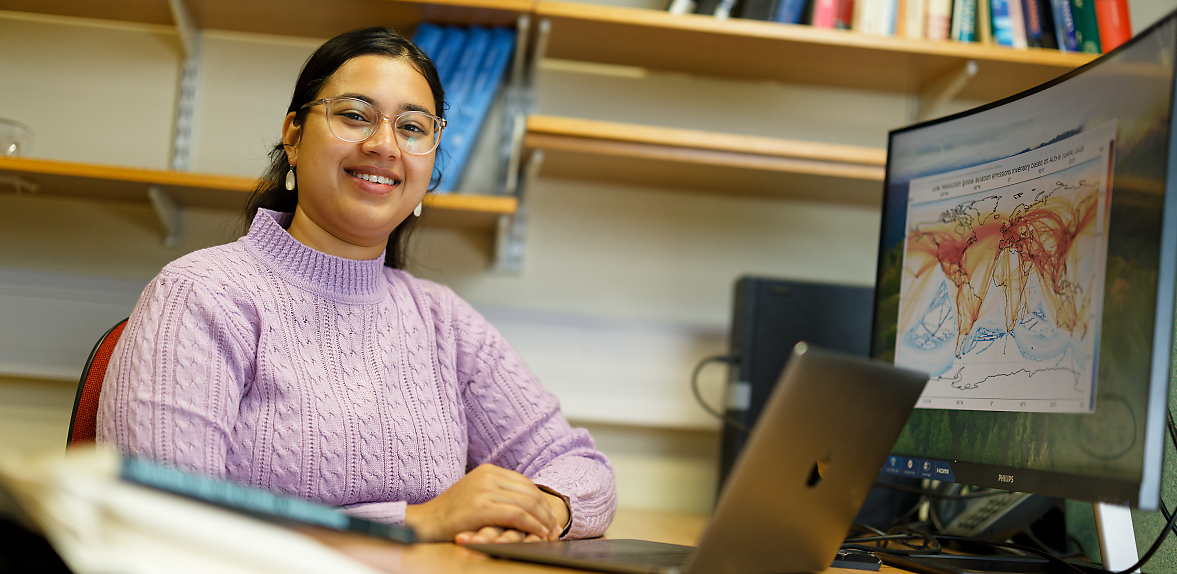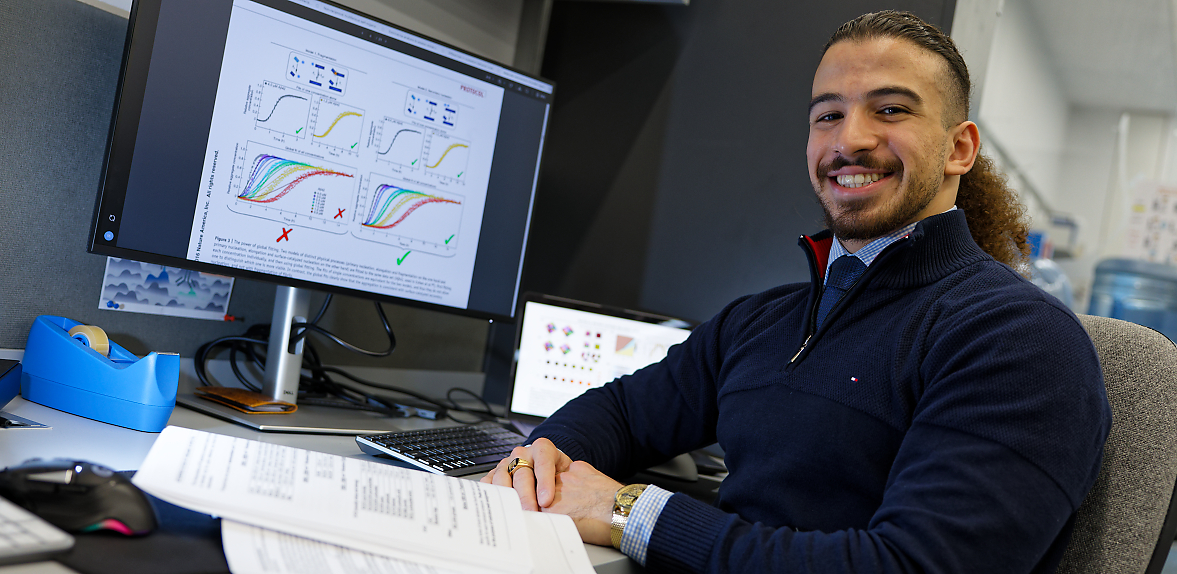
“These are excellent students who are highly valued,” says Tessa Blackman, who was the department’s postgraduate student adviser during the admissions process. “They would have been accepted without the Widening Participation criteria, but they might have found it difficult to get funding if we couldn’t also look at additional criteria, such as whether the applicants had received free school meals, were the first generation of their family to go to university, had caring responsibilities or were mature students.”
Zedric Grosvenor
EPSRC studentship
Zed’s path to the department has been unusual. Zed’s mother worked in the police force and was physically disabled after being attacked. When growing up, Zed acted as a carer for his mother, helping around the house and pushing her wheelchair. Because his father can’t drive, once Zed got his licence he also drove his mother to hospital appointments and other engagements.
In 2018, Zed completed a BSc with Honours in Forensic Science at Anglia Ruskin University. He found he had a knack for fire investigation, and his final award-winning project was on the detection of ignitable liquids from human hands and skin. “I really enjoyed that project and always wanted to return to it,” he says. But somehow life intervened.
During his undergraduate studies, Zed’s mother unexpectedly died. With his father’s encouragement he completed his degree, but Zed then returned home to help his father cope with the loss, the house and the paperwork.
During that time, Zed discovered the Royal Society of Chemistry’s teacher training scholarship programme for talented students who want to train as secondary school science teachers. He won a scholarship, and completed the course at the University of Bedfordshire, near his home. “I enjoyed teaching, absolutely,” he says. “With secondary students, it’s not so much teaching them as giving them direction and seeing them teach themselves.”
When things became difficult during lockdown, Zed remembered the research he had done at Anglia Ruskin and really wanted to complete it somehow. “I saw Stuart Clarke’s papers online and was interested. We met for an interview, and I applied.”
Zed was accepted to complete an MPhil in the Clarke group last year. “Rather than just experimenting with different products, I was learning the science of how and why they worked. I really wanted that fundamental understanding,” he says, so he decided to apply for the PhD.
Zed is now investigating how colloids could reduce the flammability of certain pharmaceutical creams and cosmetics. “This is a good match with my research looking at clay-based absorbents and how they interact with flammable liquids,” he says. The commercially sensitive project has received interest from the pharmaceutical industry.
Like many PhD students, Zed gives demonstration lectures to undergrads, so he still gets to teach. “To see the undergrads learn and gel as a group is great. I’m really happy now and love what I do.”

Zainab Hakim
Yusuf Hamied studentship
Zainab is a mature student who has two young children, aged three-and-a-half and 14 months. She completed an undergraduate and master’s degree in Physics at the University of Pune in India, where she became involved in a national initiative, under the supervision of Dr Gufran Beig, to measure pollution levels and air quality throughout India.
After Zainab got married, she moved to the UK with her husband. She initially found a position as a research assistant in Professor Alexander Archibald’s atmospheric chemistry research group, but due to family circumstances she took time out, first to work for Satavia, a startup which is working to make aviation greener, and latterly to have children.
“When I first started working in this area it was mainly out of curiosity, but I gradually started to understand the gravity of the issue,” Zainab says. “Now that the children are older, I am looking forward to getting a PhD and working with Alex on the bigger picture of air pollution and its impact on climate change.”
Zainab has overcome personal and professional challenges to return to academia. “Being in the UK, we don’t have any family here to rely on,” she says. She notes that the University has been very supportive. “The children have a place in the University nursery at Eddington. As a PhD student I was given priority, and the University has also helped with some of the funding because of our household income. The funding through the Yusuf Hamied scholarship also made it possible for me to come back.”
Zainab is thrilled to be working with Alex again. “Because I worked with him before I know that he’s amazing both in his research and as a mentor and a supervisor. Having an understanding supervisor makes a big difference.”

Shuresh Ghanbari Saheli
Yusuf Hamied studentship
Shuresh, whose parents are from Iran, grew up in Blackburn. “They wanted to give me a better life,” he says. Shuresh was always interested in physics and maths. “Although I went to a good school, I got teased a lot,” he recalls. “But that turned out to be the best thing that could have happened because it gave me time to study rather than trying to impress others.” Even so, Shuresh became a skilled footballer, going on to a semi-professional level. “But then I decided to stick with physics!” he says.
Shuresh completed an undergraduate and master’s degree in Physics at University College, London. Towards the end of his degree he became interested in neuroscience, but after several internships decided he preferred looking at the fundamental science. “I like working from the bottom up,” he says.
In the Knowles group, Shuresh has been able to combine his interest in neuroscience with his original love for physics and maths. He is looking at the kinetic aggregation of proteins, and how this is implicated in degenerative diseases. This is mainly theoretical, but he can work closely with the experimentalists to check whether his calculations are supported by the lab results. “This is one of the great things about being in the Knowles group,” he explains.
Shuresh is the first generation of his family to go to university. “My parents are so proud, they are over the moon,” he says. He loves being in Cambridge. “Cambridge is lovely, very quiet and beautiful. Amazing is the best word.”
This article was originally published in Chem@Cam magazine Issue 69.

